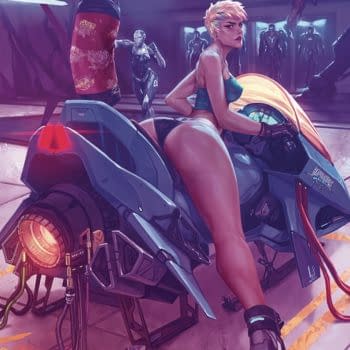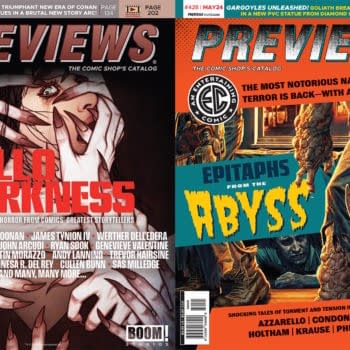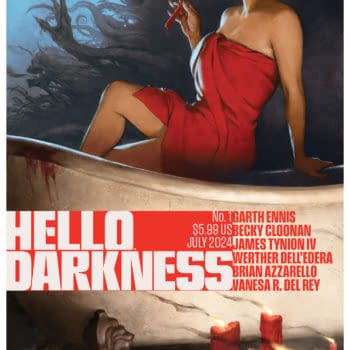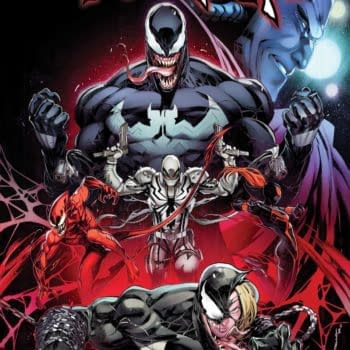Posted in: Comics, Recent Updates | Tagged: Comics, entertainment, granito, rich joshnston, rob granito
Essential 8 Questions With Rich Johnston – 'Sometimes It's Simply Having The Temerity To Treat The Comics Industry As Something Worth Reporting On'
By Erik Grove
Before I get to the proper introduction for this week's Essential 8 (spoiler – you can see what it's all about in the title, folks), I want to take some space to explain why this site and this 5th anniversary is especially resonant with me and why I've opted to do this series of meta articles. Almost exactly the same time Bleeding Cool launched, I lost my job. I had been working as a software consultant, a career that had given me some cool opportunities to travel and see the United States and had really been my first taste of post collegiate professional adulthood. I had a 401k even. But, like so many businesses in 2008/2009, the company I worked for needed to restructure and reduce costs and I was one of the costs they chose to reduce. I landed on my feet and while I look back on the events of that summer and think it was ultimately a good experience to go through, it was incredibly disorienting and terrifying for me then. One of the things I really depended on for balance was my favorite hobby, comics, and coincidentally there was this new website that was right up my alley called Bleeding Cool. I read everything that the site posted. Checking for updates was part of my daily routine and that gave me something to think about that had nothing to do with worrying how I was going to pay the rent, where I was going to get health insurance and how close I was to turning 30. Here's where I'm going with this. Comic books and Bleeding Cool, and all of the other new and fan sites, magazines, conventions and store conversations are important to us because they are the constants in the midst of chaos or they are the nostalgia or they are the common touchstones in our friendships. While we might rail against story X or event Y or some business decision or some other creative decision, at the end of the day this culture is a familiar, comforting, generally awesome thing that we get to share. That's pretty great, isn't it? I think so. Anyway, on to the meat and potatoes…
It was about a month ago when I started putting the pieces together to pitch this specific interview. I'm aware of how peculiar it is for a contributing writer on a website to interview the head writer but from the very beginning of this column, I knew I wanted to interview Rich Johnston. As someone that's been familiar with Rich and his work for about ten years, I've always been curious to learn more about him. With the occasion of the 5th birthday of Bleeding Cool, it seemed like a great opportunity and lucky for me, Rich was able to find the time. So, without further ado, I give you Essential 8 Questions with Rich Johnston!
Erik Grove: What comics did you read when you were growing up and what books would you say have been your strongest influences as a comic book fan?
Rich Johnston: Growing up, a smattering of English comedy and action adventure weekly titles, such as The Beano, The Dandy, Whizzer And Chips, Beezer, Commando, 2000AD as well as annuals at Christmas, including collections of strip cartoons like Oor Wullie, The Broons and Giles. Then, when I was nine, I discovered Marvel UK, running a bunch of Jack Kirby weekly reprints, X-Men, Thor and Fantastic Four as well as more recent Spider-Man. Throw in the UK originated Transformers and I was hooked for a few years, as the Secret Wars weekly ran for a good long while as well. I also loved comic strips in The Guardian and Steve Bell's If and Doonesbury were big favourites and certainly how I learned to draw Margaret Thatcher.
I stopped for a bit but always had an interest. It was discovering American comics in newsagents in other towns and cities that inspired me to search further afield and, as a teenager, found my first comic shop in Leeds, a bus ride away. At that point, mostly Marvel superheroes, plus the [Keith] Giffen/ [J.M.] DeMatteis Justice League got me to university when suddenly it was all Sandman, Cerebus and Sleaze Castle… and those are the ones that probably burrowed furthest into my psyche… but my biggest influence on my own cartooning remained Steve Bell. Years later I would make him very angry with a political cartoon of my own, the story of my life.
EG: What inspired you to write about comic and comic industry gossip and how did you get started doing it?
RJ: At university I discovered the internet and was gutted that I'd never had it available to me as a younger child. I think I was born to be online, just never realised it. This was also my first real access to comic book creators, aside from working at comic conventions once a year in London. You could write to them, they would reply and they would often say things quite at odds as what was being reported by the publishers to the press. The comics community on the internet then was US based with some UK offshoots and what reporting there was, was entrenched in US respectfulness of journalism as some higher form, rather than the British tabloid form which had already infected the British broadsheets and magazines in the way of gossip columns, often industry specific, that I loved to read, especially the fortnightly satirical magazine Private Eye. Politics, advertising, TV… I thought comics could be part of that. And it was that, that I felt was lacking in comic industry reportage. There was an equivalent in the British magazine Comics International, but it was either too dull or too wrong and didn't reach the USA. I thought I could do a better and more relevant job.
EG: What's a typical working day like for you? Can you step us through a day in the life of Rich Johnston?
Wake up at 8am most days, check emails, highlight ones I'll need to deal with and then get the kids ready for school, walk them up. Come home, have a cup of tea and breakfast and make a start. Firefight any major problems first, and check any problems highlighted by my publisher or editor. Then I start to think about what kind of stories I'll write for the day, going through e-mails, checking the calendar and seeing what resources I have to hand. Talking to sources is a big part of the day, and some stories take weeks to write – if they even make it to publication. And then just start hammering away and come up for breath in the afternoon when America starts to wake up. Then any emails I've sent start to get answered and stories get binned, get transformed, get confirmed and get scheduled. I talk to my editor once or twice a day on Facetime, checking any problems, working on plans for future coverage, talk about magazine content, work on some of that, all the time looking out for breaking news. Then I break, fetch the kids from school at which point some major news will usually break and we'll have to race home to deal with it. Then it's work through to the early evening, making food for everyone, going through homework, talking about the day, before some early evening work. At some point, around 9pm, I'll take a break, maybe watch some TV, but with the laptop or iPad on my lap. And then keep working usually to around midnight before collapsing. Rinse and repeat.

EG: In the past, you've infamously objected to being called a "journalist." Do you still object to that title? You've recently taken Redbubble to task for selling merchandise that uses work from comic artists without credit and you've consistently targeted and taken down scams from shady characters like Josh Hoopes and Rob Granito. What do you see as your role and Bleeding Cool's role within the comic book ecosystem? Are you one part gossip monger and one part champion for creator (and fan) rights? Am I missing some parts?
RJ: It's more to do with the way Americans often seem to see journalism as a holy of holies, an esteemed professional held to high, ivory towered standards of objectiveness. Whereas what I do is far more tabloid, involved, as much my take on a story as the story itself. I'm a hack in a country where that may be a self deprecatory term, but not embraced as an insult. It's easier to object to the tag of journalism, when it carries with it so much baggage. Also – considering that much of what actually passes for comics journalism is just regurgitated press releases and the expression of cozy relationships between writers and publishers. I remember last San Diego Comic Con sitting in the Top Cow panel, to see that CBR had published a report on the panel before it had started. Which also meant it got a few things wrong, but smacked of the whole unquestioning stage managed presentation of a publisher via the press without any questioning filter at all. I try, though often fail, to do something different.
I don't see a gossip monger as being any different to being a champion of creator and fan rights in this regard. It's all about getting a peek behind the curtain and whatever stems from that.
EG: 2014 marks the 5th anniversary since the launch of Bleeding Cool. Has the growth of the site and its development surprised you? Is this the vision you had when the site started? Where do you see Bleeding Cool 5 years from now?
RJ: My vision was to pay my mortgage. I'd just lost my advertising job, in the middle of an advertising recession and there was nothing but a small amount of freelance and temporary, part-time jobs. Bleeding Cool first filled the gap, then it took over my life. I don't think it surprised me though, I knew there was room for this growth and there is room for more. The website, the magazine, there's plenty more to come, plenty more voices to find and represent – and yes, plenty more scammers to take down. I'll keep writing if you keep reading.

RJ: Yes to both. It's generally not my intention to ruffle, and I try to smooth things over beforehand, and yes, sometimes afterwards but yes, things can kick off. Often I notice if people like the news, they are Bleeding Cool's biggest supporter, but if they dislike it than obviously I am wrong and lying and have an agenda against them. And, of course, sometimes I make mistakes.
But sometimes it's simply having the temerity to treat the comics industry as something worth reporting on. Mark Waid seemed incensed that Bleeding Cool ran the news that DC was moving to Burbank next year, and forced DC's hand to announce. DC's Courtney Simmons, acting on behalf of Diane Nelson, got in touch to express great displeasure that I ran the Before Watchmen artwork before the project was even announced, and accused me of being a pirate. Rather than, you know, doing what any good reporter would do. There is a double standard.

RJ: Well, I read comics I don't like, because others do and I am obliged to write about them. And when I have a deadline to read comics, that can sometimes be challenging. But damn it, I like the things too much for it to ever be an actual chore. I've kinda hit the jack pot. But yes, my opinions as a reader always influence my points of view as a writer. Otherwise, what would be the point?
EG: Finally, you've been doing this for 20 years now, Rich, and you've seen times of substantial changes in the industry from a unique vantage point. What do you think about the state of comics now? Are you optimistic about the future, skeptical or cynical?
RJ: I am a naturally optimistic person and I've seen plenty of changes. I think big changes are coming and I don't know whether I'll be able to sink or swim. Companies are keeping control of their information and plans tighter and tighter to their chest and sharing them with fewer and fewer folks, and as comic stores and print distributors are squeezed out of the equation, that will also have an effect. But I have also found that the more a company clamps down, the more stuff squeezes out from the sides.
And I have a bucket.
EG: Thanks Rich!
Erik Grove is a writer living in Portland, OR. You can follow him on Twitter @erikgrove and you can go to his website www.erikgrove.com to read fiction, blogs and general amazingosity. In fact, every time you go to www.erikgrove.com a kitten high-fives an angel and then unicorns have a secret rainbow dance party where they invite all of the coolest copyrighted fantasy and science fiction characters. Do it for the kittens and unicorns, people.


















